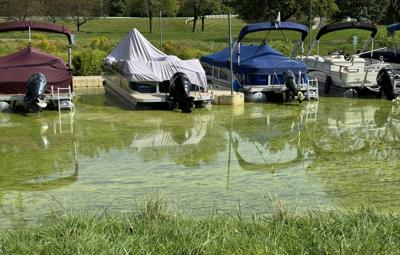A state Supreme Court judge has sided with the city of Auburn and town of Owasco in their lawsuit over the state's handling of Owasco Lake watershed rules and regulations.
Acting Supreme Court Judge Keri Savona ruled the state Department of Health erred when it determined it could not institute regulations controlling nutrient runoff from farms due to existing state agricultural laws.
Savona wrote in her decision that the department's analysis and application of the law, which covers the agricultural environment management program, is "arbitrary and capricious." The law was intended to supplement existing laws, she continued, not replace them.
"It is clear that the Legislature recognizes that nutrient pollution caused by runoff from farms is harming the state's potable and recreational water supplies," Savona wrote. "It is also clear that (the agricultural environmental management law) was passed in an effort to incentivize farmers to voluntarily ask for assistance in managing pollutants stemming from their farms."
People are also reading…
Savona added, "It makes no sense that, in response to a known agricultural and health crisis, the Legislature would determine to abolish the ability of the state to mandate rules and regulations designed to address this area of serious concern, and replace it with a program that is voluntary in nature and for which the failure to participate in the program and/or the failure to manage pollutants has no consequences."

A large harmful algal bloom makes its way to the northern shore of Owasco Lake around Deauville Island at Emerson Park in September 2024.Â
In responding to the lawsuit, the state filed a motion to dismiss the case. Savona denied that motion for the city and town, but granted it for the Owasco Watershed Lake Association because injury to the organization could not be established.
The decision is a win for the city and town in their years-long effort to update Owasco Lake watershed rules and regulations, which have been in effect since 1984.
The localities began the process of updating the watershed rules in 2017 after harmful algal bloom toxins were found in the drinking water supply. In 2020, the Auburn City Council and Owasco town board approved the updated regulations and submitted them to the state Department of Health for review.Â
Under the proposal, the watershed rules and regulations would be updated to address nutrient management on farms. Studies have shown that the , which leads to the development of harmful algal blooms in Owasco Lake, is farmland.
When the state Department of Health responded with its proposal in 2023, it excluded the nutrient management section proposed by the local group. The state's plan was to encourage non-concentrated animal feeding operation farms to participate in the voluntary Agricultural Environmental Management program.
In January 2024, the city and town filed their lawsuit against the state Department of Health. Earthjustice, a nonprofit organization, represented the municipalities.
Auburn Mayor Jimmy Giannettino called Savona's ruling "a step in the right direction in our ongoing efforts to protect Owasco Lake and the drinking water of over 45,000 central New Yorkers." Owasco Supervisor Ed Wagner added that they hope the state Department of Health "will reconsider its previous decision to not move forward with these watershed rules and regulations."
Despite its dismissal from the case, the Owasco Watershed Lake Association is pleased with the outcome.
"This lawsuit is about state policy and the roles and responsibilities of state departments," said Carol Sutkus, president of the Owasco Watershed Lake Association. "This is fundamental to protecting Owasco Lake and its watershed. The state Department of Health is trying to disavow its responsibilities to protect sources of potable water in New York and the judge has said that makes no sense."
The state Department of Health declined to comment. The agency did not say whether it will appeal the decision.
Government reporter Robert Harding can be reached at (315) 664-4631 or robert.harding@lee.net. Follow him on X @RobertHarding.
















